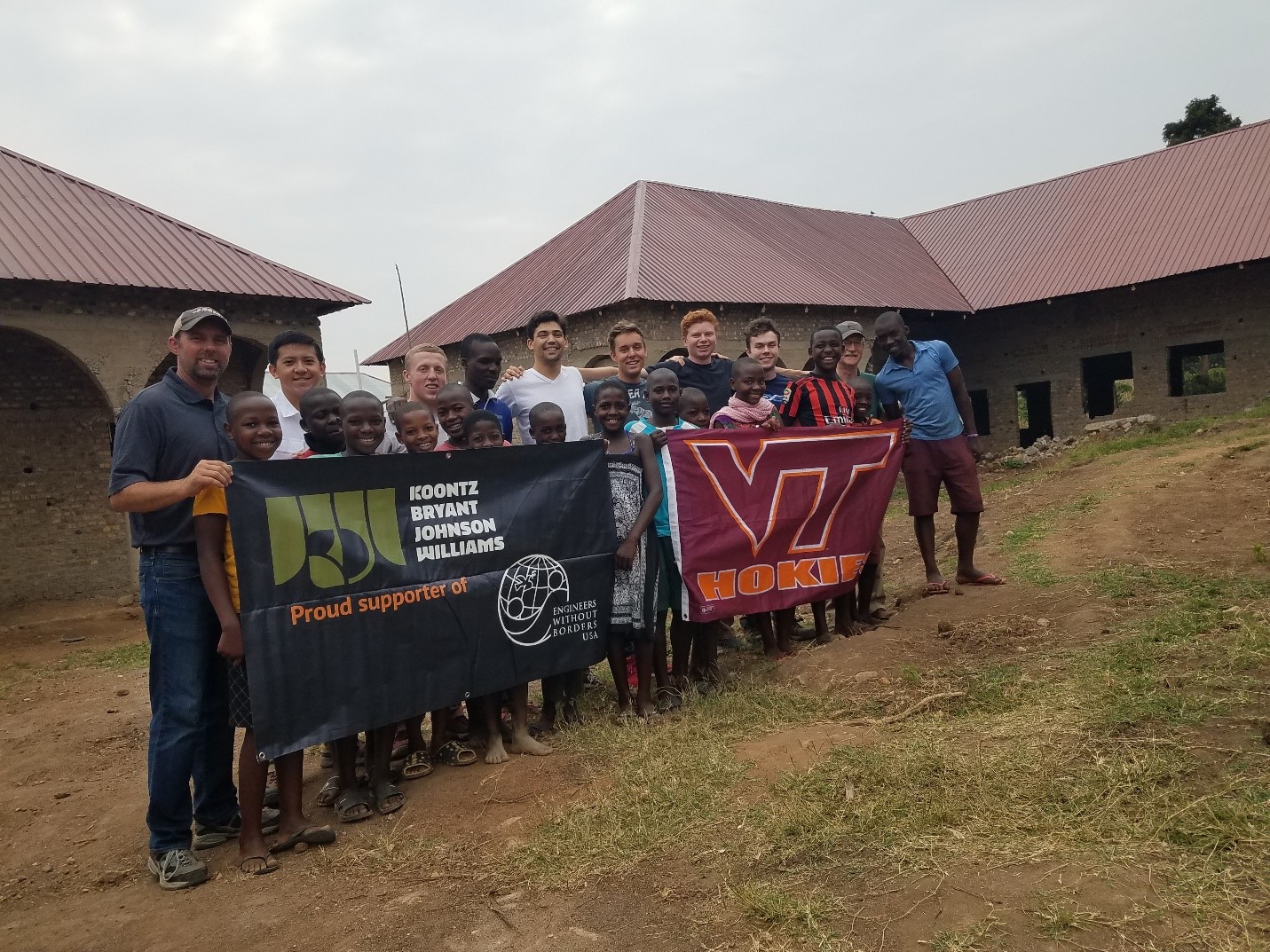
11 May 2020 KBJW Goes to Uganda with Engineers Without Borders
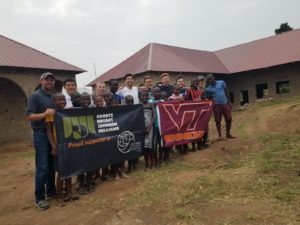 In 2018, Koontz Bryant Johnson Williams became a sponsor and active participant in the Central Virginia Professional Chapter of Engineers Without Borders (EWB). The mission of EWB is to build a better world through engineering projects that empower communities to meet basic human needs. Our Central Virginia chapter is comprised of civil engineers, geotechnical engineers, electrical engineers, geologists, and other dedicated support members. Our members are employed by various engineering firms and industry leaders. Members volunteer their time to design and implement projects around the world to improve the everyday lives of people from under-developed nations. Our members also serve as mentors for student EWB chapters. We are currently mentoring students from EWB groups at Virginia Tech and VCU.
In 2018, Koontz Bryant Johnson Williams became a sponsor and active participant in the Central Virginia Professional Chapter of Engineers Without Borders (EWB). The mission of EWB is to build a better world through engineering projects that empower communities to meet basic human needs. Our Central Virginia chapter is comprised of civil engineers, geotechnical engineers, electrical engineers, geologists, and other dedicated support members. Our members are employed by various engineering firms and industry leaders. Members volunteer their time to design and implement projects around the world to improve the everyday lives of people from under-developed nations. Our members also serve as mentors for student EWB chapters. We are currently mentoring students from EWB groups at Virginia Tech and VCU.
In 2019 our chapter partnered with the Virginia Tech student chapter to implement new water and electrical systems at two schools in southern Uganda, Hope Academy, and St. Michael’s School. The basic needs at both schools are similar and preliminary plans for development began early in 2019.
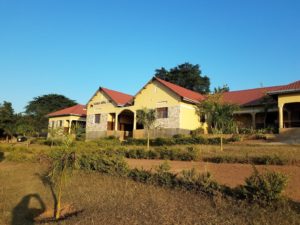 Hope Academy
Hope Academy
Hope Academy is a primary and secondary school for children between the ages of 5 and 17. The school currently teaches approximately 350-400 students each year with current expansion underway to serve an additional 150 +/- children. A large portion of the student body are day students that travel from nearby villages to be taught reading, writing, mathematics, computer skills, and history. Some of the students are full time residents at Hope. These students may be orphans or have other life circumstances that make Hope the ideal place to call their permanent home.
The academy living quarters and classrooms are served by limited power from the national power grid supplemented by roof top solar panel units installed by past EWB chapters. This enables the school to have basic lighting and to operate a small computer lab with approximately 12 basic desktop machines for training. Water is a daily challenge at Hope. A previous well drilled at the facility is only partially usable at this time and does not provide enough water for the school’s needs. A surface water supply (pond) is present adjacent to the facility and is utilized during portions of the year. This supply is extremely unsafe due to surface influences from nearby livestock and other animals. A third option for water supply is catchment tanks from rooftop rainfall runoff. During the rainy season in Uganda, rains can allow for the collection of large quantities of water in tanks that can be used for several months after the 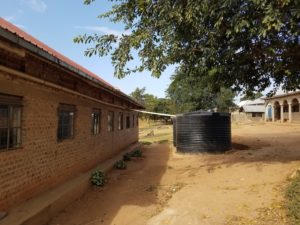 season is over. This source provides some of the cleanest water available to the school. All sources require boiling the water before consumption. Wastewater at the school only consists of latrines with no running water, treatment, or true disposal mechanism. Our chapter met with representatives from the school to prioritize their needs. With the new construction and expansion of the school, the need for more usable drinking water is top priority. We reviewed the previous designs implemented at the school and determined that additional rainfall catchment tanks were the most practical solution to meet this need. A preliminary design plan was developed. In August of 2019, I along with Phil Powell from our chapter traveled to Uganda with 5 students from Virginia Tech and 1 student from Purdue University to evaluate the site and develop final plans for implementation of the tank installations.
season is over. This source provides some of the cleanest water available to the school. All sources require boiling the water before consumption. Wastewater at the school only consists of latrines with no running water, treatment, or true disposal mechanism. Our chapter met with representatives from the school to prioritize their needs. With the new construction and expansion of the school, the need for more usable drinking water is top priority. We reviewed the previous designs implemented at the school and determined that additional rainfall catchment tanks were the most practical solution to meet this need. A preliminary design plan was developed. In August of 2019, I along with Phil Powell from our chapter traveled to Uganda with 5 students from Virginia Tech and 1 student from Purdue University to evaluate the site and develop final plans for implementation of the tank installations.
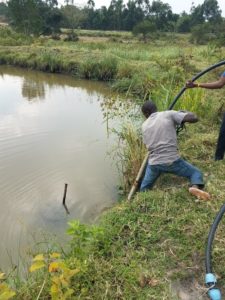 While at Hope, we collected measurements and site layouts for the new areas of building construction. We evaluated past catchment tank construction for areas of improvement, and determined ideal locations for new catchment tanks and distribution lines. The preliminary information needed for our final plans and specifications were gathered including materials and labor available in the region. We spent our week living in the quarters at Hope Academy. This enabled us to see the needs of the school, its staff, and its students first hand. It also allowed us to interact with the students on a daily basis and develop new friendships with our partners in Uganda. Currently our chapter is compiling the information gathered in our August 2019 trip into final design plans with the intention for implementation of the project in the summer of 2020. The new catchment tanks will aid in supplying additional water to the students, staff and residents of Hope Academy. This basic human need is something that we take for granted in America but is a daily challenge for many people across the world and is certainly a challenge for our new friends and partners in Uganda.
While at Hope, we collected measurements and site layouts for the new areas of building construction. We evaluated past catchment tank construction for areas of improvement, and determined ideal locations for new catchment tanks and distribution lines. The preliminary information needed for our final plans and specifications were gathered including materials and labor available in the region. We spent our week living in the quarters at Hope Academy. This enabled us to see the needs of the school, its staff, and its students first hand. It also allowed us to interact with the students on a daily basis and develop new friendships with our partners in Uganda. Currently our chapter is compiling the information gathered in our August 2019 trip into final design plans with the intention for implementation of the project in the summer of 2020. The new catchment tanks will aid in supplying additional water to the students, staff and residents of Hope Academy. This basic human need is something that we take for granted in America but is a daily challenge for many people across the world and is certainly a challenge for our new friends and partners in Uganda.
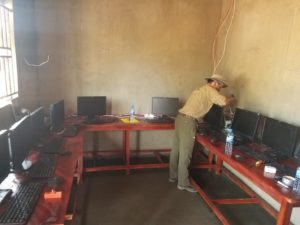 St. Michael’s School
St. Michael’s School
St. Michael’s is a primary school serving approximately 100 +/- students ages 5-12. The school has recently completed a new building that will allow for a small increase in capacity as well as provide better classrooms for the students. On our August 2019 trip, newly installed rooftop solar panels were connected to a new inverter that will allow safe electrical service for the new building. Our EWB chapter assisted local laborers with the installation of new lighting and 10 new computers within the new computer lab.
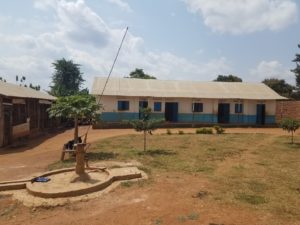 The school also contained a drilled well that served the school and surrounding villages for many years until it was damaged in approximately 2012. Since that time, the well has been out of service and water supply now depends upon surface sources that are unclean and unsafe for consumption. Our chapter is working with local labor to complete the necessary repairs to the well, and yield testing to determine the viability of the well. Upon completion, we will utilize this information to design new storage tanks and distribution systems that will be used by the students as well as people living in the neighboring area. This system will provide a central source of cleaner water for hundreds of students and residents of the area.
The school also contained a drilled well that served the school and surrounding villages for many years until it was damaged in approximately 2012. Since that time, the well has been out of service and water supply now depends upon surface sources that are unclean and unsafe for consumption. Our chapter is working with local labor to complete the necessary repairs to the well, and yield testing to determine the viability of the well. Upon completion, we will utilize this information to design new storage tanks and distribution systems that will be used by the students as well as people living in the neighboring area. This system will provide a central source of cleaner water for hundreds of students and residents of the area.
Our Central Virginia Professional Chapter is dedicated to assisting people around the world with solutions to challenges in supplying the basic needs of human life. We at KBJW are dedicated to this cause and proudly support EWB with our time, effort, and financial contributions. If you would like to learn more about EWB, our projects, or are interested in volunteering or assisting with funding, please visit our website at www.ewb-cva.org or contact me at bjohnson@kbjwgroup.com.

